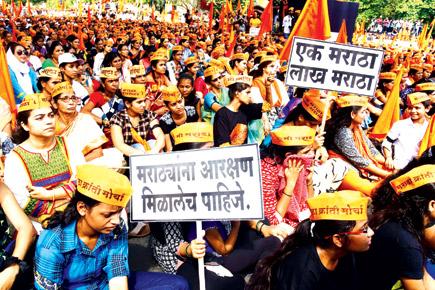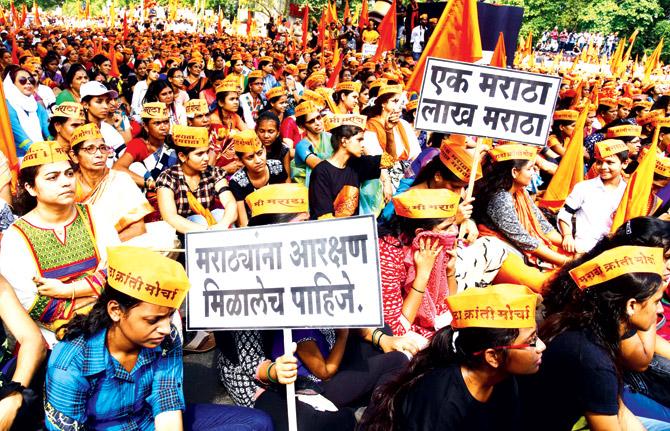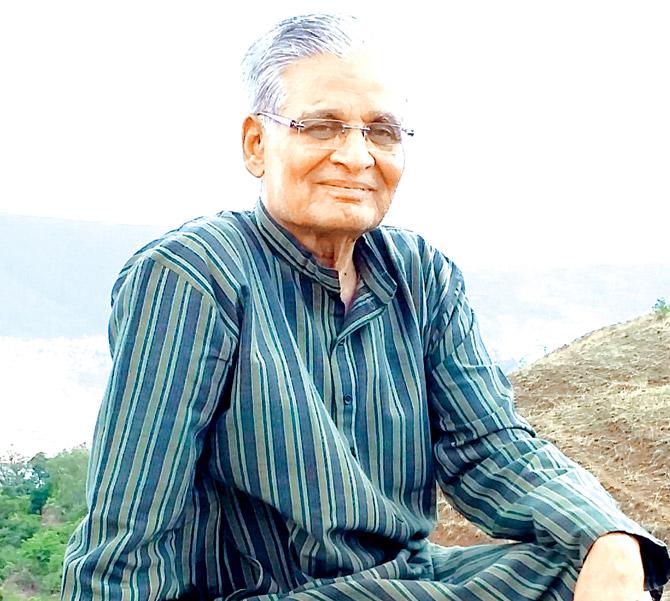Even as Mumbai readies for the March 6 Maratha protest, Dr A H Salunkhe, in a straight-laced guidebook suggests that the way forward may be by looking inward


Members of the Maratha community at a protest in Thane on October 16, 2016
 Hoardings with crammed mug shots of supporters alongside their political big bosses (customarily smiling kurta/sari-clad appa, dada, anna, bhau, tai, vahini) have long served as tools of showing mass support. But the "politics of banners" is labelled as a curse in ideologue Dr A H Salunkhe's slim guidebook (65 pages, R50, Lokayat Prakashan) titled Maratha Samaj: Itihas, Vartaman Ani Bhavishya (Maratha Society: Past, Present and Future). Dr Salunkhe questions the vacuous sense of self-importance the Maratha chieftains derive from their life-size cut outs.
Hoardings with crammed mug shots of supporters alongside their political big bosses (customarily smiling kurta/sari-clad appa, dada, anna, bhau, tai, vahini) have long served as tools of showing mass support. But the "politics of banners" is labelled as a curse in ideologue Dr A H Salunkhe's slim guidebook (65 pages, R50, Lokayat Prakashan) titled Maratha Samaj: Itihas, Vartaman Ani Bhavishya (Maratha Society: Past, Present and Future). Dr Salunkhe questions the vacuous sense of self-importance the Maratha chieftains derive from their life-size cut outs.
ADVERTISEMENT
Dr Salunkhe, in a candid-but-polite tone, has hit out at a key feature of Maratha politics. Maratha strongmen across political parties have thrived on ostentatious birthday celebrations, religious observances and mega election rallies. Dr Salunkhe feels the astronomical amounts spent on advertisements of flashy personal-political events can be devoted to the welfare of fellow Marathas, many of whom are landless labourers, subsistence farmers, unaided students looking for scholarships and penurious families unable to afford medical care. He feels the Maratha leadership, which supports the recent morchas demanding reservations in government jobs and colleges, should be attentive to the changes required in their own political culture and personal behaviour. "If you claim the legacy of the noble large-hearted Chhatrapati Shivaji, why do you wish to impose your puny little personality on the people around you?"

Dr Salunkhe
Dr Salunkhe's wake-up call holds a special cultural significance for two reasons. First, the respected tri-lingual ideologue-historian, known for 50 volumes on subjects ranging from sant Tukaram to Buddhist monk-traveller Hsuan Tsang to the Charwak school of thought, writes at a crucial juncture when Maharashtra has witnessed 50 well-attended silent rallies by the Marathas, and the countdown to the March 6 Mumbai mega rally has generated abundant awe. It is said the Mumbai morcha may be a tipping point of the street protests that started in August 2016.
Second, Dr Salunkhe is not just another writer but the founder of the alternative Shiv Dharm movement (questioning the exploitative Brahmin priest-oriented religious rituals in Hinduism); he is associated with organisations like Maratha Seva Sangh (to which the notorious Sambhaji Brigade owes its allegiance). He is a follower of the Satyashodhak Samaj social reform society; a staunch believer in Buddhist doctrines of community peace as well as Babasaheb Ambedkar's tenets of egalitarianism. Often, his writings have evoked strong social responses; his 1981 comment piece in the now-defunct Kirloskar Marathi magazine (Loss of political power: A golden opportunity for the Marathas) led to a deluge of 5,000 letters, which is a record in itself. Dr Salunkhe's silence on certain Maratha controversies has also evoked reactions.
In his latest guidebook, based on his October 16, 2016 public speech at the Sakal Maratha Sammelan at Ambajogai (Beed), Dr Salunkhe praises the non-violence and self-restrained silence manifested in the morchas. He admires the value of community cleanliness (record-breaking assembly with no littering) that the marches espouse and the intelligent use of social media to garner youth support. But, he feels, the harmony should continue for a larger social purpose, so that consistent self-examination becomes a healthy pre-condition for the Marathas at every stage. He wants all Marathas to embrace progressive values that make an evolved, forward-looking community, shunning its obscurantist past.
For instance, Dr Salunkhe says the participation of women in the morchas is a matter of admiration, but the equality of sexes should extend in real lives too. Dr Salunkhe says it is high time the Marathas, who revere Jijabai (the mother of Shivaji), abolish social evils like female foeticide and dowry. He narrates instances of several families which had to sell their landholdings in order to raise funds for dowries; not to forget the Maratha clans which have not allowed widow remarriages.
At every possible juncture in the book, he denounces violent strategies, aggression directed at other castes and most importantly, illogical demands that put the government and judiciary in a fix. For instance, he supports the Maratha Kranti Morcha's key demand of amendment in Scheduled Caste and Scheduled Tribe (Prevention of Atrocities) Act, 1989, to stop its misuse in the context of the several instances where the piece of legislation was used by Dalits against non-Dalits to settle personal scores. However, he clarifies, that it is not fair to demand the scrapping of the Act, which a few agitated Maratha factions have done in the past. His voice of moderation stands out amid the Ek Maratha Lakh Maratha firebrand activism.
Dr Salunkhe outlines the scope of self-improvement in the Maratha youth in the context of New Age needs. He feels the youth needs to pay greater attention to wider reading and articulation in order to compete in a world run by sophisticated expression. "If you were to rewrite Maratha history, which you feel is misrepresented or stereotypical, wouldn't you need to speak and write well? If popular cinema and theatre misinterprets the Maratha sensibility in broad sweeping strokes, will you not need an alternative diction to fight the malaise and introduce the shades of grey?" he questions. Without naming Maratha leaders who demonstrated the potential but could not deliver at the national level, Dr Salunkhe says the lack of language skills have stunted Maratha leadership in high offices. Short of mentioning Sharad Pawar as the leader who couldn't rise in New Delhi because of his poor Hindi and English skills, he puts it inoffensively, "the more languages you know, the richer you grow."
The 74-year-old does not fear the possible reactions of his audience. He says: "It takes time for people to extend past their comfort zones. But people do change at some point and writers like me have to continue to advocate change. I am aware that the pace of change is slow and that my ambit of influence is limited. But both factors cannot stop me from saying what I want to say."
Sumedha Raikar-Mhatre is a culture columnist in search of the sub-text. You can reach her at sumedha.raikar@gmail.com
 Subscribe today by clicking the link and stay updated with the latest news!" Click here!
Subscribe today by clicking the link and stay updated with the latest news!" Click here!







